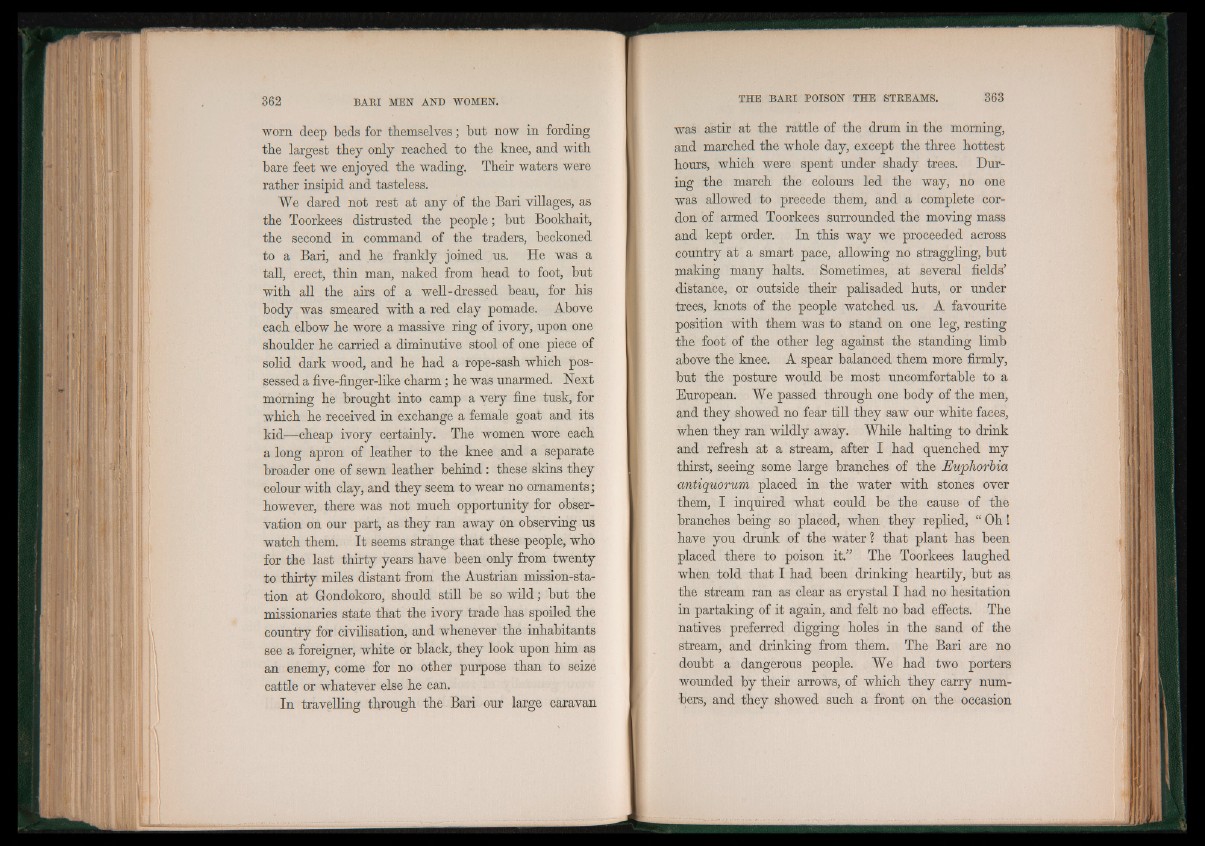
worn deep beds for themselves; but now in fording
the largest they only reached to the knee, and with
bare feet we enjoyed the wading. Their waters were
rather insipid and tasteless.
We dared not rest at any of the Bari villages, as
the Toorkees distrusted the people; but Bookhait,
the second in command of the traders, beckoned
to a Bari, and he frankly joined us. He was a
tall, erect, thin man, naked from head to foot, but
with all the airs of a well-dressed beau, for his
body was smeared with a red clay pomade. Above
each elbow he wore a massive ring of ivory, upon one
shoulder he carried a diminutive stool of one piece of
solid dark wood, and he had a rope-sash which possessed
a five-finger-like charm; he was unarmed. Next
morning he brought into camp a very fine tusk, for
which he received in exchange a female goat and its
kid—cheap ivory certainly. The women wore each
a long apron of leather to the knee and a separate
broader one of sewn leather behind : these skins they
colour with clay, and they seem to wear no ornaments;
however, there was not much opportunity for observation
on our part, as they ran away on observing us
watch them. It seems strange that these people, who
for the last thirty years have been only from twenty
to thirty miles distant from the Austrian mission-sta-
tion at Gondokoro, should still be so wild; but the
missionaries state that the ivory trade has spoiled the
country for civilisation, and whenever the inhabitants
see a foreigner, white or black, they look upon him as
an enemy, come for no other purpose than to seize
cattle or whatever else he can.
In travelling through the Bari our large caravan
was astir at the rattle of the drum in the morning,
and marched the whole day, except the three hottest
hours, which were spent under shady trees. During
the march the colours led the way, no one
was allowed to precede them, and a complete cordon
of armed Toorkees surrounded the moving mass
and kept order. In this way we proceeded across
country at a smart pace, allowing no straggling, but
making many halts. Sometimes, at several fields’
distance, or outside their palisaded huts, or under
trees, knots of the people watched us. A favourite
position with them was to stand on one leg, resting
the foot of the other leg against the standing limb
above the knee. A spear balanced them more firmly,
but the posture would be most uncomfortable to a
European. We passed through one body of the men,
and they showed no fear till they saw our white faces,
when they ran wildly away. While halting to drink
and refresh at a stream, after I had quenched my
thirst, seeing some large branches of the Euphorbia
antiquorum placed in the water with stones over
them, I inquired what could be the cause of the
branches being so placed, when they replied, “ O h!
have you drunk of the water? that plant has been
placed there to poison it.” The Toorkees laughed
when told that I had been drinking heartily, but as
the stream ran as clear as crystal I had no hesitation
in partaking of it again, and felt no bad effects. The
natives preferred digging holes in the sand of the
stream, and drinking from them. The Bari are no
doubt a dangerous people. We had two porters
wounded by their arrows, of which they carry numbers,
and they showed such a front on the occasion